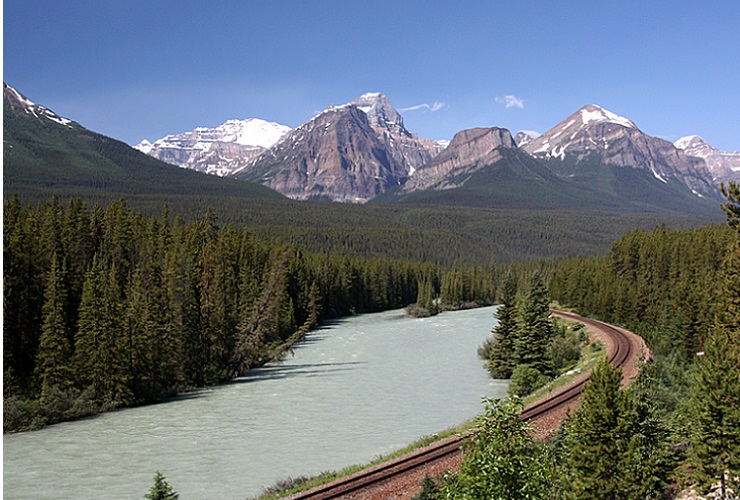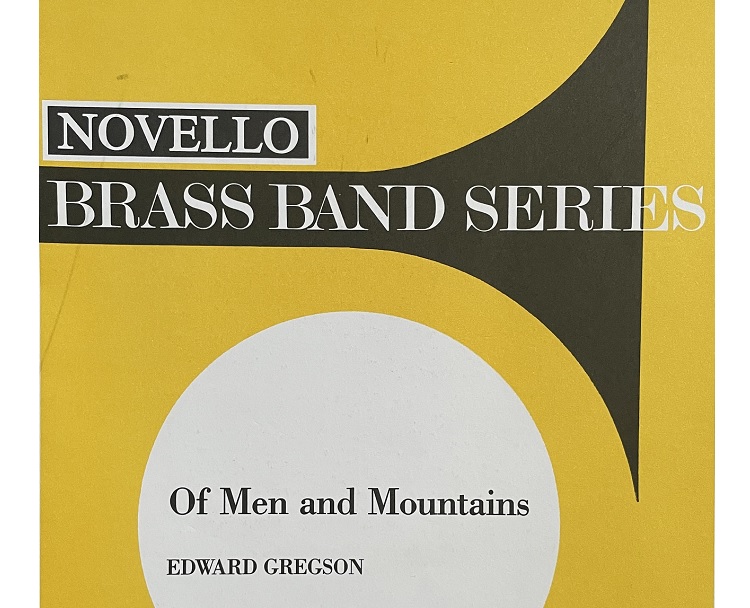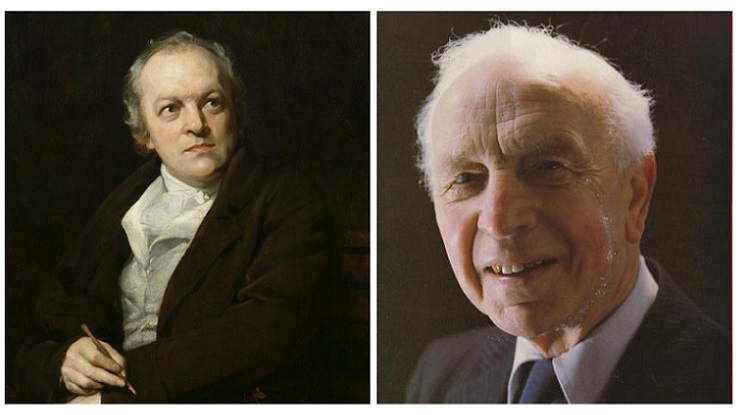
William Blake’s gnomic poetic verse is well worth reading in exploring the musical as well as metaphorical scope of Edward Gregson’s ‘Of Men and Mountains’.
The title is not a direct quote, but instead speaks ‘of’ the composer’s understanding of the dichotomies that Blake (1757-1827) felt existed in man’s desire to gain dominion over the natural world without submitting to the fragile urge to destroy its beauty in the process.
“The sword sang on a barren heath,
The sickle in the fruitful field
The sword he sang a song of death,
But could not make the sickle yield”.
Train journey
An epic train journey undertaken with his wife Sue in July 1989 traversing the glories of the Rocky Mountains from Toronto to Vancouver gave him the inspiration for the symphonic tone poem that explored his own thought processes.
Construction of the railroad itself had started in the late 1880s, the last spike driven into the soil some five years later to complete an East to West transcontinental link of over 2,000 miles that helped define the emerging Canadian nation.

Prophetic vision
It remains a mammoth piece of civil engineering – one that mirrors Blake’s prophetic vision that ‘Great things are done when men and mountains meet’.
By blasting their way through rocks and spanning rapids, bridging gorges, and hugging river courses, an army of engineers, surveyors and navvies created a man-made artery liberating the ability to transport goods as well as people across, through and over its natural boundaries.
Yet, it does not despoil its surroundings but reveals even greater natural beauty and majesty to those who travel on it.

Epic proportions
Gregson’s own epically proportioned work (for the time that is, at around 17 minutes) was completed within a year – a continuous lineal development from embryonic fragments to majestic apotheosis.
It received its premiere at the Dutch National Championships in December 1990. Interestingly, he dedicated the work to Eric Ball (alongside William Blake below) – another composer inspired by a mountainous metaphorical interpretation of the true meaning of attainment.

Seven year arc
It is also worth remembering that it would also have been the third in a seven-year arc from 'Connotations' (1977) through 'Dances & Arias' (1984) to be used at the National Finals – each developing his defined style of writing for the medium as well as pushing, with considered appreciation, its boundaries.
Contentiously (to the composer and others) it was rejected - its own proportions considered to be epically unsuitable.
That short sighted elliptical absence though has now come to an end, and we can finally enjoy it performed in a hall that itself has always had the epic proportions to convey its message
That short sighted elliptical absence though has now come to an end, and we can finally enjoy it performed in a hall that itself has always had the epic proportions to convey its message (although we still await his ‘Symphony in Two Movements’).
Musical intellect
The tensions explored are of musical intellect, the challenges to the MDs much like those faced by a surveyor pondering a map to work out the smoothest way to carve a track line through granite rock.
Explosive virtuosity though is made redundant, as the pacing of progress echoes the lie of the natural topography of the score – at times slow and mysterious (as at the opening), at others fast and dramatic, in eight defined sections.

Complexities
The complexities are revealed in plain sight, with the overall flow made up of countless eddies of change (right to the very end); little draws and pulls, pushes and pulse within each of the sections, at times connecting, at others creating meaning within.
This is music of time and space, breadth and control, with the climaxes naturally defined in energy and dynamic. Rhythmic patterns are rugged and fractured like marbled rock splinters, or smooth and languid like slow flowing riverbeds.
Capture the composer’s searching intentions and the music draws your attention like a passenger contemplating the majesty of the surroundings through the window of the train rather than stopping off at a plasticised ‘Hard Rock’ café built to overlook a local beauty spot.
Searching intentions
Capturing the composer’s searching intentions and the music draws your attention like a passenger contemplating the majesty of the surroundings through the window of the train rather than stopping off at a plasticised ‘Hard Rock’ café built to overlook a local beauty spot.
There are no meaningless cadenzas, or europop back beat detours, aided by percussion writing that is carefully calibrated and sensitively coloured, from a soft bow drawn on the vibraphone to jubilant tubular bells and razor-sharp side and tenor drums.

Motifs (such as the semi quaver led ‘call’ first heard in the horn) emerge and hide, only to reappear once more pushed up through the earth of the score - from sop to tuba (both of which are worked hard throughout).
And whilst there is no overarching thematic climax, different strands are drawn to immensely satisfying conclusions.
Needless struggle and tension abound only if approached by MDs with a dull-witted mechanical shovel to dig through the transparent scoring.
Needless struggle and tension abound only if approached by MDs with a dull-witted mechanical shovel to dig through the transparent scoring.
The natural flow brings expectation and excitement, beauty and contemplation. It is music that does not require artificial enhancement.
Sustained energy
The slow introduction is followed two development sections, each deliberately differentiated in pace and grouping (one 152 the other 138), before the music draws with sustained energy towards its central core.
Tender and mysterious, here it flows seamlessly (crotchet = 60) between semplice lead lines for cornet, euph and horn – all drawn forward with a passionate incremental pulse rate towards a perky (but not frantic) scherzo (dotted minum = 96) and through to its majestic close. The clever coda is a joyful pulse of energised memory (underpinned by a reprise of those initial ‘calls’) that drives (up to 168) to the end.
‘Of Men and Mountains’ has long been admired as a generational work of stature and importance. Now it can now finally be heard in all its glory.
It has been well worth the wait.
Iwan Fox













